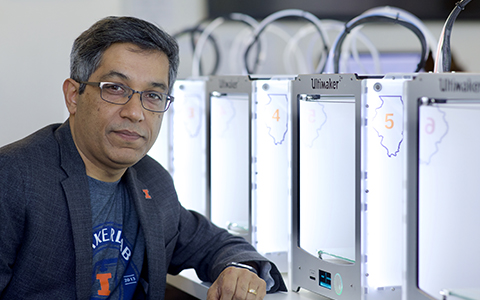Jan 17, 2024
Illinois MakerLab prints 3D objects to aid in heart transplant research
The Illinois MakerLab at Gies College of Business is fostering healthcare innovation through a partnership with Carle Health researchers seeking to help children who have had heart transplants.
The multisite project studies whether magnetic resonance imaging (MRI) technology could replace the need for invasive biopsies when determining if young patients are rejecting their transplanted hearts. Biopsies involve removing heart tissue, whereas MRI scans produce detailed images with no need to remove tissue.
“Right now, routine screening for rejection is performed using biopsies, so of course that’s really invasive,” said Carly Lockard, a staff scientist at Carle. “It would be really nice if we could come up with a less invasive way to monitor these patients.”
Lockard works in the Clinical Imaging Research Program in the Stephens Family Clinical Research Institute at Carle Foundation Hospital in Urbana. There, Bruce Damon, director of Clinical Imaging Research, is leading part of this research that focuses on making sure the study is collecting high-quality image data.
The study, led by doctors at the Medical College of Wisconsin and Vanderbilt University, is taking place at more than 10 sites across the country, including Carle. To help with the study, the MakerLab printed 3D components for building objects called phantoms. Researchers use the finished phantoms in the MRI scanners to measure the quality of the imaging. Each 3D-printed object functions as a holder for liquid-filled tubes that allow the researchers to measure and account for differences over time and across MRI scanners at the different sites.
The MakerLab opened in 2013 as the world’s first business school 3D printing lab. Housed in the Business Instructional Facility at Gies Business, students from across the University of Illinois Urbana-Champaign campus help run the MakerLab as volunteers and employees, gaining opportunities to aid in leading-edge projects while making an impact.

“The MakerLab provides students with an open canvas to explore their skills in tinkering with technology, dealing with clients, and handling real business transactions,” said Vishal Sachdev (left), director of the Illinois MakerLab and a clinical associate professor in business administration at Gies Business.
Lockard collaborated back and forth with the MakerLab to optimize the design, customizing and making improvements with each iteration. Once the team settled on a final design, the MakerLab printed the phantoms for each research site.
“The 3D printing gives us more flexibility than other manufacturing processes,” Lockard said. “We can make really customized shapes. Being able to do multiple iterations of the design has been really nice. We don’t have to go with whatever we first came up with – we can really optimize it.”
Now that the MakerLab has the final design, it can continue to print more phantoms if needed as the researchers continue their study. The MakerLab’s role in healthcare innovation doesn’t end there. The lab also partners with CIM3D, a student-led group from the Carle Illinois College of Medicine, to host 3D printing workshops.
The CIM3D student group recently conducted a two-day workshop in the MakerLab to print stents, which are used to unblock arteries, giving medical students a better understanding of the principles of stent design while introducing them to 3D printing.
Through the MakerLab, medical school students are learning to think innovatively about medical product design and how to individualize products for patient care. The heart transplant research project and medical student workshops are just two of many examples that demonstrate the MakerLab’s role in helping push boundaries in impactful ways.
“3D modeling and printing allow experimentation and customization at a low cost, which is critical in healthcare,” Sachdev said. “And it is great as a teaching tool as well.”
For more information about opportunities to partner with the MakerLab or work in the MakerLab as a student, visit the MakerLab website. You can contact the MakerLab to discuss opportunities and learn more.
